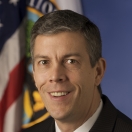

Ed. note: This is cross-posted on The Root. See the original post here.
Following Michael Brown’s tragic death, people across the country — and the world — have grieved together and engaged in critical conversations about race and community relationships. When President Barack Obama hosted a dialogue in December with young people on the issues in Ferguson, Missouri, I asked the youngest members of the Ferguson commission how I could be helpful. They asked me to visit Ferguson — to listen to the stories of the people who live there — because youth, in particular, were hurting.
I listened. Recently, I traveled to Ferguson. I visited the Clyde C. Miller Career Academy High School, Grandview High School, Ferguson library and the Greater St. Mark Family Church to meet with students, educators and community leaders to hear their thoughts on race, equity and trust since Brown’s death.
The stories I heard from students showed a real sense of uncertainty about the future that far too many young people in communities across this country feel. During one of several stops through Ferguson, I met with Gbemisola Fadeyi, a student at Hazelwood East Middle School. Gbemisola said that since the death of Michael Brown, “I feel like it would be a blessing to get to the age of 16 without being killed by someone. I am so fearful of a lot of things now, and I shouldn’t be scared, I shouldn’t be scared.”
She’s right: All young people should grow up free from fear and violence. But there are too many neighborhoods and communities where fear and violence are part of a student’s daily life. Gbemisola and other young people said that they have been scared — not only for themselves but also for their family members, particularly since Brown’s death.
From the students to the teachers and to superintendents, school board members and union leaders, what I felt was their searing honesty, as well as a deep sense of selflessness. Diamond Smith, a junior at Riverview Gardens High School, shared that in an effort to help her community, she had given her entire paycheck from her after-school job to a homeless man who was feeling broken and hopeless. Stories like these from Gbemisola and Diamond are both heart-wrenching and inspiring.
In Ferguson, I also saw a willingness to reflect and a commitment to long-term action. While there is a great deal of hurt and anger, there’s also great interest among the young people, community leaders and educators to work together to turn around a very tough situation — to ensure trust and to build strong relationships among law enforcement and other officials and the communities they serve. The students I met with at Clyde C. Miller Career Academy High School, for example, are reviewing their old classroom notes on the civil rights movement of the 1960s in hopes of organizing their own movement toward social justice in 2015. They’re seeing and sensing that they are a part of rewriting the history of their own community.
Like civil rights leaders who came before them, these students and educators see education as a means of addressing inequities and injustices. They noted that they are tired of the disparities in their local school systems — whether it’s a lack of access to quality early-childhood education, to Advanced Placement classes, to adequately funded schools, to strong instruction or to after-school programs.
Education is — and must continue to be — the great equalizer that overcomes differences in background, culture and privilege. Educational opportunity represents a chance at a better life, and no child should be denied that chance. Where our children lack that opportunity, it’s not just heartbreaking; it is educational malpractice. It is morally bankrupt, and it is destructive to our nation’s future. I don’t believe that we’re going to solve the challenges in Ferguson and other communities from Washington, D.C., alone, but we can be part of the solution if we listen closely to the people living in these communities. Making things better for kids, their families and their schools will take all of us working together. We can — and we must — get to a better place.
President Obama and this entire Administration are committed to finding practical solutions to seemingly complex problems. In keeping his promise to find a way to bridge the gap between law enforcement and the communities they serve, the President established the Task Force on 21st-Century Policing, which will be releasing its recommendations by March. I also have assigned members of my team to continue to work with the Ferguson community. In the long term, we are committed to growing opportunity through the My Brother’s Keeper initiative and through laying out principles for equity that must guide a new Education and Elementary Secondary Act.
Arne Duncan is the U.S. Secretary of Education.
See more about:


